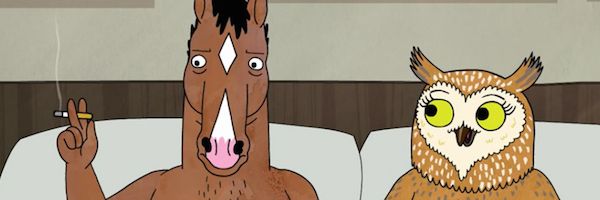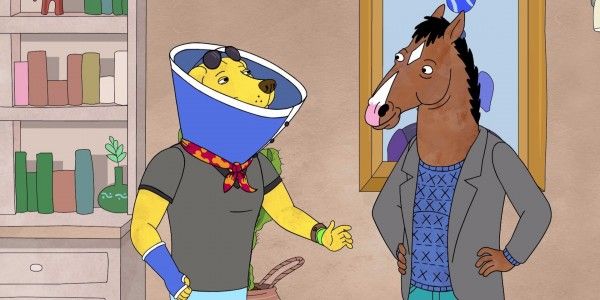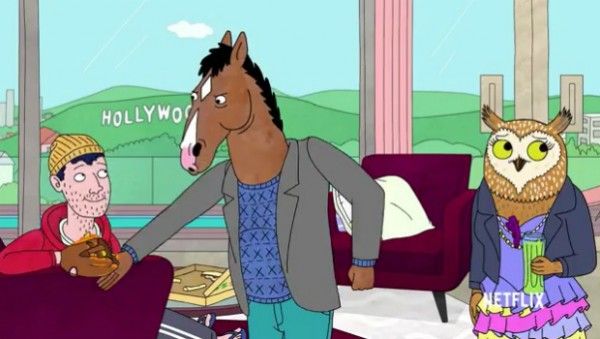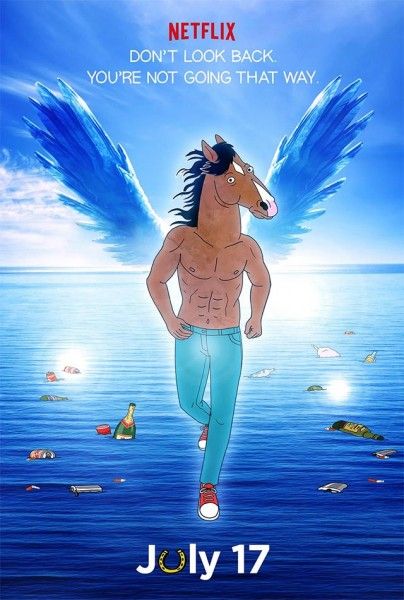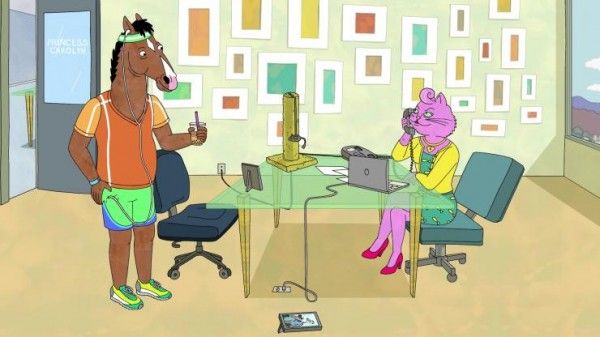To be perfectly honest, there is a continuous sense in BoJack Horseman Season 2 that the series is at least partially held up by its sheer strangeness, and that’s not just because Amy Sedaris voices a pink cat-woman hybrid that works as an agent for the titular equestrian actor (Will Arnett) as well as a renewed J.D. Salinger, voiced by Alan Arkin. The truly odd element in Neflix’s remarkable animated series is the dry, intermittently absurd tone, which makes the series sound and feel more like a Paul Mazursky movie than the zanier, darker realms of Adult Swim (which its animation style suggests an affinity for). In reality, BoJack Horseman is rooted more in early Nickelodeon humor, but does have shades of Aqua Teen Hunger Force, Space Ghost Coast-to-Coast, and, at its very best, the prominent works of Matt Groening. And with a newfound looseness in the narrative, Season 2 delights even more in the distinctly dialectical guffaws that creator Raphael Bob-Waksberg and his writers feed generously into each episode.
To be fair, there does seem to be the semblance of a method behind Bob-Waksberg’s unerring madness. The world of BoJack, a former sitcom star now grasping for meaning and respect as a movie star, is equally made up of human beings and animal-human hybrids, and the main difference would seemingly be the influence of Hollywood or, more basically, fame. In other words, those obsessed with themselves, or just especially vain, have their images literally rendered in ridiculousness, from a nervy penguin ex-publisher, Pinky (Patton Oswalt), to Lisa Kudrow’s owl-lady television exec, fresh out of a 30-year coma. The show’s central subject seems to be the plague of celebrity, a lucrative curse that benefits from being presented and analyzed in ludicrous animated form. It’s not particularly easy to empathize with the troubles of the rich and (occasionally) famous, but Bob-Waksberg has seemingly found a wondrously expressive route to consider the issues inherent in those who depend on public popularity to live.
It’s not surprising, then, that the first episode of Season 2 begins with a flashback to BoJack’s childhood under the reins of his emotionally abusive mother, Beatrice (Wendie Malick), who regularly reminded her son that he was a disappointment. In the first scene, our hero, as a pre-adolescent, is seen watching Secretariat (John Krasinski) being interviewed by Dick Cavett on TV while his parents fight in the background, laying the groundwork for BoJack’s dream project of doing a Secretariat biopic. He’s now realizing that dream, months after his biography, penned by Diane Nguyen (Alison Brie), became a literary sensation, and the general lack of change that this revival brings to BoJack’s inner turmoil would seemingly be the initial subject of Season 2. The ultimate meaninglessness of fame, outside of its flimsy fiscal comforts, is Bob-Waksberg’s focus. But he’s not a complete cynic, as BoJack’s lonely life is quickly enlivened and positively challenged by Kudrow’s supremely reasonable character.
BoJack’s new romance is, aside from the filming of the Secretariat film, the only real narrative backbone of the season, allowing for a greater range of storylines and a more ambitious sense of character development. The continuing misadventures of Todd (Aaron Paul), BoJack’s homeless best friend and roommate, lead the young man to build his own, intensely dangerous amusement park and rescue a chicken-person from a farm, while Diane and Mr. Peanutbutter (Paul F. Tompkins) hash out the intimacies of married life. Then there's Sedaris's Princess Carolyn, who must come to terms with her boyfriend, Vincent Adultman (Fielding Edlow), a child posing as an adult in a trench coat, and BoJack similarly facing the ghost of his longtime friend and collaborator, Herb Kazzaz (Stanley Tucci), who finally passes, but not exactly how you might expect. This tonnage of sardonic yet quasi-sincere encounters and connections only intermittently aspires to belly laughs (example: the "elephant in the room" gag from episode 6), but it's unerringly fascinating, clever, and beguiling in its emotional resonance. These things cannot be said about many other modern animated programs, and they are what ultimately elevates BoJack Horseman into the modern pantheon of animated programs, alongside Bob's Burgers, South Park, and Archer.
★★★★ Very good — Damn fine television
BoJack Horseman returns to Netflix on Friday, July 17th at 12:01am PT.

